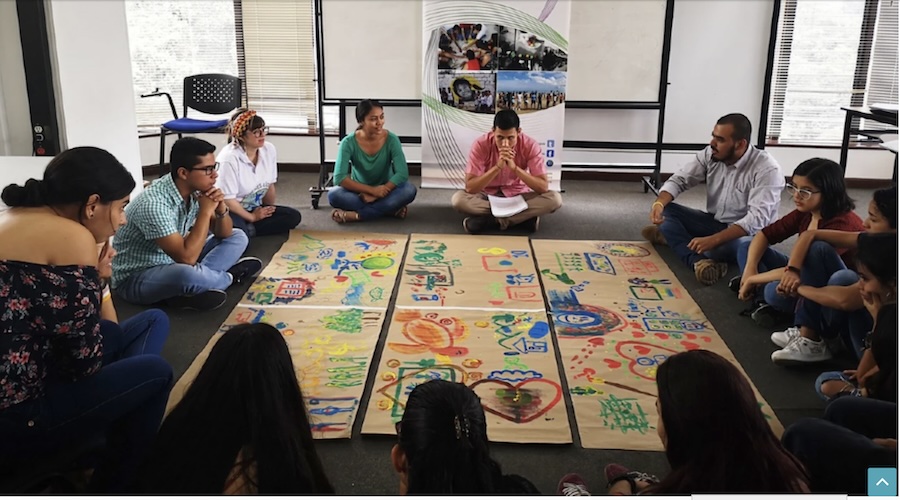… EDUCATION FOR PEACE …
Excerpts from extensive analysis at Peace Education Campaign Country Maps
The development of peace education in Colombia is shaped by the complex history of armed conflict, internal displacements, and the ongoing efforts to construct a lasting and inclusive peace. Targeted efforts addressing its challenges have resulted in Colombia emerging as a global leader in peace education.

Training for young volunteers at the University of Toloma. Ibagué, Toloma. November 2019. (Photo: Schools of Peace Foundation archive)
Non-governmental organizations (NGOs) have played and continue to play a significant role in strengthening peace education in Colombia, with their active engagement at the local level, collaboration with communities, and creation of resources for effective programs. Furthermore, a key aspect of peace education in Colombia is its local approach, with programs and initiatives tailored to meet the needs of local communities. . . .
One of the primary formal initiatives for peace education in Colombia is “La Cátedra de Paz,” which aims to create and consolidate a space for learning, reflection and dialogue on the culture of peace and sustainable development that contributes to the general well-being and improvement of the quality of life of the population, established by Law 1732 of 2014, and regulated by decree 1038 of 2015. . . . .
Non-formal peace education efforts in Colombia are led by numerous NGOs that engage directly or indirectly in peace education through educational programs, teacher training, community initiatives, and extensive research. They have a great impact in strengthening institutional commitments to peacebuilding, often acting as intermediaries between the government sector and educational institutions, as well as mobilizing other actors who are not formally linked to the educational sector.
Social organizations actively support the documentation of experiences and insights, contributing to a deeper understanding of the methods and underlying reasons that make peace and human rights integral to the educational sector. . . .
In Colombia a territorial approach to peace education has been one of the major trends that have emerged in the country. . . . The territorial approach has been implemented using various strategies, often leveraging local resources and asking teachers and communities to analyse the conflict dynamics in their specific settings. This ranges from initiatives to prevent recruitment into criminal gangs and improve economic conditions to initiatives that focus on strengthening local communities and conflict resolution.
(Continued in right column)
Where is peace education taking place?
What is happening in Colombia, Is peace possible?
(Continued from left column)
Peace Education Organizations, Models & Projects in Colombia
Overview initiatives/organizations connected to different approaches
Historical memory
- Red Departamental de Maestros y Maestras por la Memoria Histórica del Departamento del Caquetá
- Rodeemos el Diálogo RED.
- Comunidad de Prácticas Pedagógicas de Paz del Legado de la CEV
- The National Center of Historical Memory (CNMH)
- La Paz Querida
- Banco de República – La paz se toma la palabra
- Fundación Escuelas de Paz
Territorial
Intersectional/gender
- Corporación Humanas Colombia
- Red Nacional de Mujeres (National Women’s Network)
- Ruta Pacífica de Mujeres
- Corporación Sisma Mujer
- CIASE
Ethnic/intercultural
- National Conference of Afro-Colombian organizations
- National Indigenous Organization of Colombia (ONIC)
- Proceso de Comunidades Negras (PCN)
Human rights
- Human Rights Study Center
- Fundación Escuelas de Paz.
- Centro de Investigación y Educación Popular (CINEP/PPP)
Ethic and conflict resolution
- Fundación para la reconciliación
- Escuelas de Palabras
- Aulas en paz
- Centro de Conciliación y Arbitraje de la Cámara de Comercio de Bogotá (CCACB)
- Educapaz – CRESE
- Fundación Escuela Nueva
- La Alianza para el Fomento del aprendizaje SocioEmocional en Colombia (AFSEC)
- Corporación Otra Escuela
Civil participation, democracy, and citizen competencies
- Programa Escuelas de Conversación Generativa ECG – (La Paz Querida)
- Civix
- Redepaz (Peace Network)
- Viva la Ciudadanía
- EDUCAPAZ
Teacher training
- La red de Escuelas Normales por la Paz
- Instituto Colombo Alemán para la Paz – CAPAZ
- Aulas en Paz
- PazatuIdea
- Fundación Escuelas de Paz